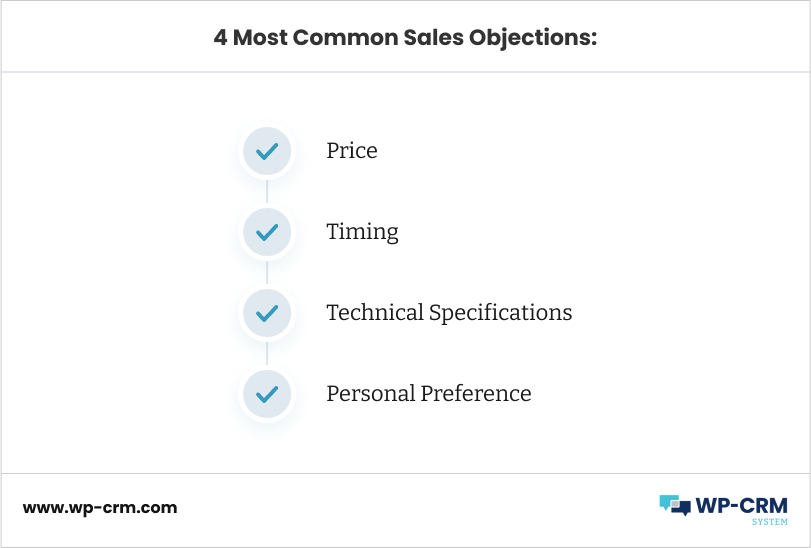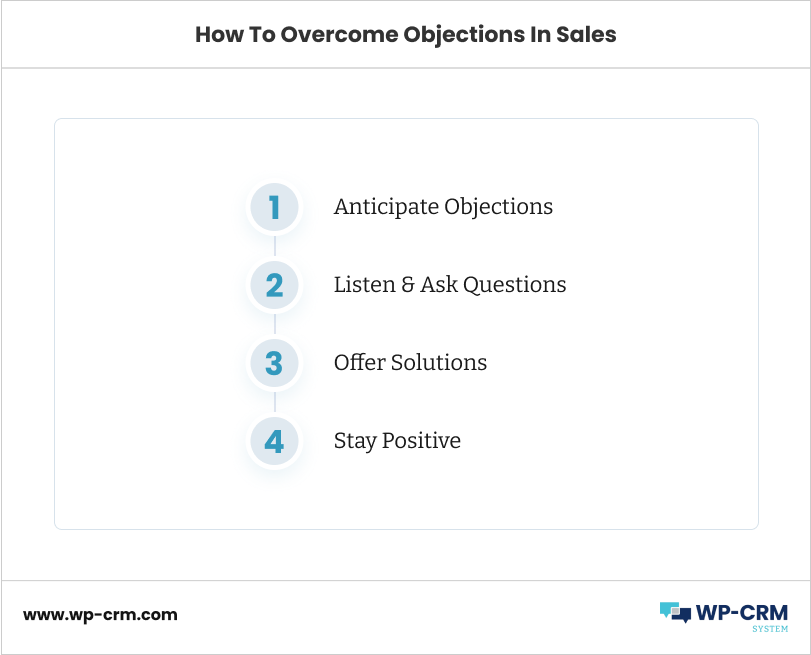How To Tackle Sales Objections
It’s no secret that sales objections are one of the most challenging aspects of business. From understanding why they occur to navigating difficult conversations with potential customers, handling objections can sometimes feel like a never-ending process. But there is hope; with the right strategies, you can tackle this issue head-on and increase your chances of success.
When trying to win a new lead, sales objections and lack of trust are normal. 60% of customers say “no” four times before converting. Therefore, key skills for an effective sales strategy are perseverance and the ability to negotiate according to your prospects’ needs.
In this article, we will explore why sales objections occur, what are the most common ones, as well as provide best practices for overcoming them.
Why Do Sales Objections Occur?

Objections are one of the most difficult but inevitable aspects of sales. It can be challenging to understand why they occur, what triggers them and how to address them effectively (especially if you are new to the field). As such, any salesperson needs to have a thorough understanding of this issue if they hope to succeed in their role. Also, a reliable customer relationships management system to track sales communications can work wonders when such objections come up!
One of the key reasons why sales objections occur is that customers often have doubts about whether the product or service will live up to their expectations. These reservations stem from mistrust, rather than any real concern over quality or value. Additionally, customers may raise issues related to pricing, competitors’ offerings or the legitimacy of your product that need to be addressed.
Sales objections may occur also due to a customer not understanding how a particular product works. For example, if you’re selling a software solution, some customers may not understand how it will solve their specific problem. This may raise questions about technical specifications and functionality. Lack of knowledge can also lead to uncertainty whether a particular feature is necessary for them in the long run.
Objections also happen when customers feel like they’re not getting enough value for their money or that there’s too much risk involved with purchasing your product/service. This could be due to factors such as delivery times, returns policies or customer support guarantees which haven’t been clarified or explained properly beforehand.
Finally, sales objections can also emerge from personal preference. Customers might decide that the offering doesn’t meet their individual needs on a psychological level (i.e., colour choice isn’t ideal, they are not familiar with the work model you use, etc.).
4 Most Common Sales Objections

Although objections in sales are quite common, they don’t have to be ever-present. Knowing how to properly handle them can go a long way in increasing your chances of success. Here are some of the 4 most common sales objections you may face:
Price
Price is one of the most common objections that salespeople encounter. Customers may view your offering as too expensive compared to the market, or even too cheap to believe it’s legitimate. In either case, it’s important to be prepared with good explanations about why their product/service is worth the cost. This could include providing examples of success stories or offering discounts or promotions.
Timing
Customers may object if delivery or turnaround times seem like they will be too slow for their needs. So, be upfront about any potential delays and help customers understand why such a process is necessary, discuss quality control measures or emphasise customer satisfaction as the top priority. Additionally, offering quicker and more efficient shipping options can help put customers at ease.
Technical Specifications
When selling technical products such as software solutions, customers may raise doubts about specific features or functionality not working as expected. A salesperson must respond with detailed answers that address each point carefully, provide additional information on how the product works and discuss any related technical limitations upfront. Also, answering questions proactively before they arise can help reduce confusion and build trust with potential customers.
Personal Preference
As mentioned, personal preference is another possible issue that might arise when trying to close a deal. Customers might decide that what you’re offering isn’t visually appealing enough or don’t live up to their expectations on an emotional level (i.e., feeling reassured). While it’s not always possible to cater to everyone’s tastes, asking relevant questions to provide tailored solutions can go a long way in addressing these sorts of issues as soon as possible!
Objection Handling Best Practices

Being able to recognize, respond to, and neutralize objections can be the difference between a successful sale and one that falls through. Many sales professionals are familiar with the basics of objection handling. However, to stand out from the competition they must master the best practices for effective objection handling.
Anticipate Objections
The key to success in sales is to anticipate the objections that potential customers may have before they even express them. Understanding what could potentially go wrong and preparing for it ahead of time will give you an edge when it comes time to close a sale. To do this, experienced sales professionals study their prospective customer’s needs and objectives before offering solutions. This way, they can prepare answers for any coming objections. This practice also establishes trust with customers by demonstrating your understanding of their requirements and expectations.
Listen & Ask Questions
When someone expresses an objection during a sales pitch, it is important not to become defensive or dismissive of their concerns. Salespeople should listen carefully and identify exactly why the customer has these objections so they can be addressed properly. Questioning techniques such as repetition and probing can help uncover further information that shed light on the actual issue being raised. Once this has been established, you can move forward with a tailored response that addresses their concerns directly instead of simply trying to talk them out of objects in general.
Offer Solutions
Once you know the reasons behind a sales objection, it’s time to provide them with solutions or alternatives that will make them feel comfortable moving forward with the sale. This might include offering discounts, providing additional services or products at no cost, giving guarantees or warranties on certain items, etc. Whatever solution you propose should directly address their immediate concerns while still providing value for your company. Additionally, make sure that these solutions don’t come across as patronizing or condescending. After all, customers don’t respond well to these kinds of tactics!
Stay Positive
Maintaining a positive attitude throughout the sales process is critical for successful objection handling. Even if someone has serious doubts about your product or service, showing enthusiasm and determination to help will often convince them to take another look at what you have to offer. Staying positive also helps keep conversations productive – nobody likes feeling like they are arguing every step of the way! And finally, smiling goes a long way toward creating a friendly atmosphere which encourages people to open up about their real reservations instead of just saying “no” outright.
Key Takeaways
To wrap it up, getting customers to buy your product or service can be a tricky endeavour. It requires thought and consideration of their needs and wants – as well as proactively addressing any issues that arise during the sales process. By remembering why objections come up and having strategies for objection handling, you will build a strong foundation for sales success.
Sales objections should be seen as opportunities not roadblocks. Therefore, make sure you are ready for them: anticipating objections, listening actively and responding with solutions. Staying positive is key to gaining the trust of customers and moving through sales objections successfully. If you adopt these best practices, you will be better equipped to start tackling difficult situations head-on.
